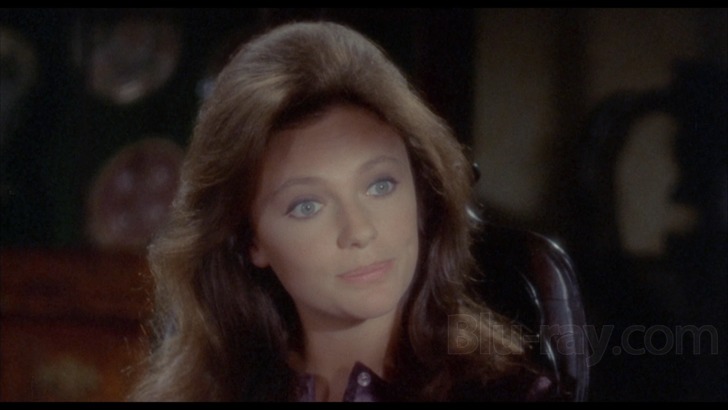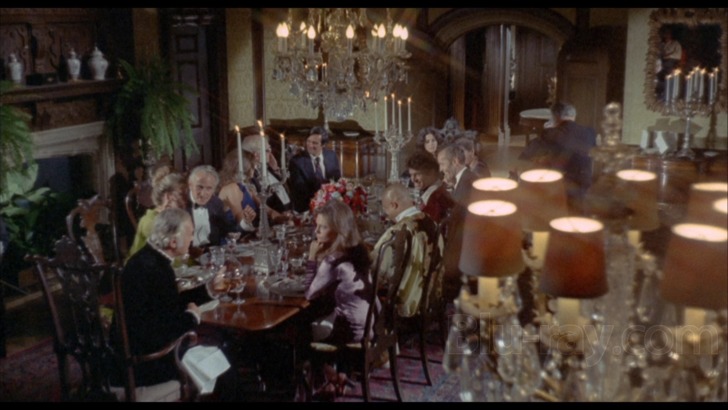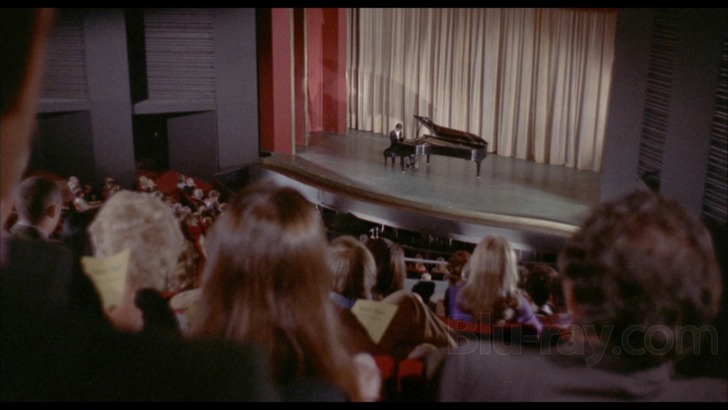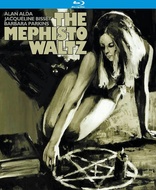The Mephisto Waltz Blu-ray Movie
HomeThe Mephisto Waltz Blu-ray Movie 
Kino Lorber | 1971 | 115 min | Rated R | Apr 18, 2017Movie rating
6.1 | / 10 |
Blu-ray rating
| Users | 0.0 | |
| Reviewer | 3.0 | |
| Overall | 3.0 |
Overview
The Mephisto Waltz (1971)
Alan Alda plays a classical piano player on the rise who befriends a famous player himself who's at death's door. Unknown to Alda, the guy is a satanist, who arranges to have their souls switch places at his death, so that he can be young again and continue to play piano (thus needing a skilled piano player like Alda to switch bodies with)...
Starring: Alan Alda, Jacqueline Bisset, Barbara Parkins, Bradford Dillman, William WindomDirector: Paul Wendkos
| Horror | Uncertain |
| Supernatural | Uncertain |
Specifications
Video
Video codec: MPEG-4 AVC
Video resolution: 1080p
Aspect ratio: 1.85:1
Original aspect ratio: 1.85:1
Audio
English: DTS-HD Master Audio 2.0
Subtitles
English SDH
Discs
Blu-ray Disc
Single disc (1 BD)
Playback
Region A (B, C untested)
Review
Rating summary
| Movie | 2.5 | |
| Video | 2.5 | |
| Audio | 3.5 | |
| Extras | 3.0 | |
| Overall | 3.0 |
The Mephisto Waltz Blu-ray Movie Review
Reviewed by Brian Orndorf May 9, 2017Movies about the Devil and Satanism became big business in 1970s, preying on fears of organized evil and spiritual corruption. The subgenre would really strike oil with 1973’s “The Exorcist,” which raised panic over unholy business to monumental levels, but it started small, with 1971’s “The Mephisto Waltz” attempting to raise small-scale hell with its tale of manipulation and fantasy. Based on the Fred Mustard Stewart novel, the picture submits a rather complicated inspection of Satanic suspicion, making it alarmingly slow-going as director Paul Wendkos labors over details, not a greater flow of suspense. “The Mephisto Waltz” is more of a tempered look personal doom, requiring a general relaxation of expectations as the production tries to pore some psychedelic melt from the 1960s into a horror experience for a new decade of terror.

Once a promising pianist, Myles (Alan Alda) has settled into a career of music journalism, trying to support wife Paula (Jacqueline Bisset) as they build a life with their pre-teen daughter, Abby (Pamelyn Ferdin). Assigned an interview with top pianist Duncan (Curt Jurgens), Myles is introduced to a man with particular tastes, living carefully with his adult daughter, Roxanne (Barbara Parkins). Drawn to his perfect hands, Duncan befriends Myles, challenging him to work on his piano playing, while Paula is less impressed, disturbed by the man’s presence and Roxanne’s odd way of being. However, Myles is changed by the connection, eventually selected for bodily transfer as Duncan and Roxanne use the powers of Lucifer to secure the master pianist’s talents after his body withers away due to leukemia. Forced into a difficult position of repulsion, confusion, and seduction, Paula is left to figure out what’s happened to Myles, questioning if she really wants her old husband back.
“The Mephisto Waltz” isn’t a traditional horror picture. It’s far more psychological, with an odd set-up that finds Duncan searching for a perfect set of hands to continue his career as a pianist from beyond the grave. Instead of overt shock, there’s a slow-burn sense of doom, mostly found in dreamscapes where Paula is left to decode her nighttime adventures, which often blur the boundaries of reality as she begins to piece together an understanding of the friendship between Myles and Duncan. Fans of jump scares and ghoulish imagery will find little to enjoy here, as the most striking image in “The Mephisto Waltz” concerns Duncan’s hellhound at a swinging costume party wearing a human mask.
Wendkos goes more for unnerving encounters than panicked ones, though some of the darkest areas of the story are only mildly tended to, including a brutal personal loss for Paula she doesn’t treat with any normal response, approaching tragedy with the same reaction she would have for the discovery of moldy bread. It’s bizarre, along with the pairing of Alda and Bisset, who make for a curious married couple, though the film doesn’t make any time to grasp their initial attraction. Alda is hardly the everyman type, and while his nervous energy is welcome in “The Mephisto Waltz,” it’s not the sharpest casting, leaving Bisset to carry much of the movie. Paula’s odyssey is filled with paranoia, but there’s an intriguing sliver of interest from the overwhelmed wife, who doesn’t exactly reject her husband’s demonic upgrade, experiencing a different Myles in life and in the bedroom, while his rise as a touring concert pianist carries a certain regality she’s not entire ready to deny, despite the presence of evil around her. As talky a feature as it is, “The Mephisto Waltz” connects with weird ideas like this, in need of more pains of duality and lustful blindness. These concepts certainly offer the movie more to do than Paula’s uneventful detective work.
The Mephisto Waltz Blu-ray Movie, Video Quality 

The AVC encoded image (1.85:1 aspect ratio) presentation provides a startlingly soft look at "The Mephisto Waltz." Detail is difficult to come by, as the age of the transfer and the feature's stylistic choices combine to pull texture out of most scenes. Clarity isn't impossible to find, but sharpness doesn't reach as far as hoped, smoothing out design achievements and diluting close-ups. Colors are also mildly deflated, supplying passable but not remarkable hues with costuming and set decoration. Skintones are adequate. Grain is heavy, chunkier. Source delivers is share of speckling. Mild banding is detected.
The Mephisto Waltz Blu-ray Movie, Audio Quality 

The 2.0 DTS-HD MA sound mix carries hiss throughout the listening experience, while the track's general quietness requires a substantial boost in volume to bring it up to expectations. Dialogue exchanges aren't dynamic, but dramatic efforts remain intact, handling extremes in panic and hushed revelations without distortion. Scoring is louder, commanding the mix, getting as close to a precise read of instrumentation as possible. Sound effects are blunt, along with group activity.
The Mephisto Waltz Blu-ray Movie, Special Features and Extras 

- Commentary #1 features film historian Bill Cooke.
- Commentary #2 features actress Pamelyn Ferdin.
- And a Theatrical Trailer (2:26, SD) is included.
The Mephisto Waltz Blu-ray Movie, Overall Score and Recommendation 

Perhaps most troubling about "The Mephisto Waltz" is its resemblance to a television movie. The production doesn't aim for a cinematic take on Paula's nightmare, instead playing most of the effort flat. Only a tireless score from Jerry Goldsmith really gives the movie some depth, helping Wendkos find the moods of terror he's looking for. Scale just isn't a priority to the production, which hopes to unnerve its audience from a more personal space, exploring changes in behavior and a gradual understanding of threat. "The Mephisto Waltz" is unique in the manner it goes about showcasing what evil is capable of, but it doesn't carry expected momentum. Villainy takes more of a leisurely journey here, making it difficult to get wrapped up in strange occult events
Similar titles
Similar titles you might also like

Alucarda
Alucarda, la hija de las tinieblas
1977

Female Vampire
La comtesse noire
1973

Nosferatu the Vampyre 4K
Nosferatu: Phantom der Nacht
1979

At Midnight I'll Take Your Soul
À Meia-Noite Levarei Sua Alma
1964

Baron Blood
Gli orrori del castello di Norimberga
1972

Cauldron of Blood
Blind Man’s Bluff
1968

Vampyres
Daughters of Dracula
1974

Lemora: A Child's Tale of the Supernatural
1973

Horror Rises from the Tomb
El espanto surge de la tumba
1973

Zoltan, Hound of Dracula 4K
Dracula's Dog / Kino Cult #16
1977

Death Bed: The Bed That Eats
1977

House of Mortal Sin
The Confessional
1976

Frightmare
1974

Baba Yaga
1973

Countess Dracula
1971

Twins of Evil
1971

Daughters of Darkness
Les lèvres rouges | Remastered Special Edition | 4K Restoration
1971

The Boxer's Omen
Mo / 魔
1983

The Nude Vampire 4K
La vampire nue | Limited Edition | Indicator Series
1970

Shanks 4K
Standard Edition
1974
